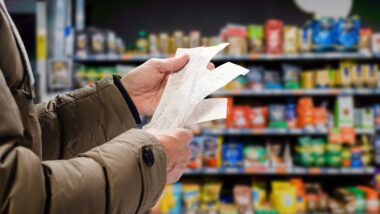Top Class Actions’s website and social media posts use affiliate links. If you make a purchase using such links, we may receive a commission, but it will not result in any additional charges to you. Please review our Affiliate Link Disclosure for more information.
The US has placed widespread economic sanctions on Russia amid its deadly invasion of neighboring Ukraine, and American consumers are already beginning to feel the effects.
President Joe Biden has, among other things, prohibited Americans from doing business with Russia’s central bank — and frozen its assets within the US — banned Russian energy imports, and, most recently, banned Russian vodka, diamonds, and seafood.
While the US only imports 3% of its oil from Russia, according to The Wall Street Journal, that is enough to affect prices at the pump, with gas prices soaring to record levels around the country.
International trade law expert Jennifer Diaz of Diaz Law told Top Class Actions that, in addition to gas price increases, consumers could see a rise in food costs.
“Everyone needs food and gas — if the cost of food rises, this has an impact on everyone, and we all see the impact of rising gas prices already,” Diaz wrote in an email.
Diaz says consumers should also expect construction costs to rise due to Russia and Ukraine being significant producers of several critical metals and the cost of air travel to go up, with US passenger planes barred from entering Russian airspace.
“Bottom line, food, gas, construction, and travel are all immediately impacted – which consumers are certain to feel,” Diaz wrote.
Biden also recently revoked Russia’s ‘most-favored nation’ trade status, reports USA Today, which will greatly increase duties placed on allowed Russian imports.
And the administration has banned all Russian airplanes — passenger, cargo, or otherwise — from entering US airspace.
Russia has responded to the sanctions by placing its own ban on certain exports — including medical, electrical, agricultural, auto, and telecom equipment, among other things — to the US and other western countries, Reuters reported.
The most immediate concern for the majority of American consumers is undoubtedly the cost of gas, with prices at the pump on the rise and futures for US oil topping $100 for the first time since 2014, CNBC reported.
Peter A. Quinter, a shareholder at GrayRobinson and a specialist in U.S. customs and international trade law, told Top Class Actions that the ban on Russian petroleum affects well beyond what we put in our vehicle’s tank.
“Most people don’t realize, it’s not just the gas you put in your car, but the gas that gets put in planes and ships and other forms of transportation and other products that are made from petroleum,” Quinter said. “There’s a chain of inflation that will occur on any product related to petroleum, that eventually affects every consumer.”
In addition to the bans and sanctions, several companies have pulled out of doing business in the country, including major brands such as McDonald’s, Starbucks, JP Morgan Chase, and Goldman Sachs, per The New York Times.
The Biden administration has also banned the export of certain US goods and services to Russia, including those related to computers, lasers, technology, semiconductors, and telecommunications, according to The Times.
Quinter says that while the export ban will undoubtedly affect US companies — and possibly consumers — it is too early to tell how significant the impact will be as Russia is ultimately only one country of many.
“US companies will end up finding different markets around the world for their products,” Quinter said. “They may not get paid more than they were getting paid in Russia, and that may or may not affect US consumers.”
The effect US sanctions will have on food prices is also a major concern for consumers, namely products that contain grain, with Ukraine and Russia accounting for nearly 30% of the world’s wheat production, reports Agri-Pulse.
Despite the high output, Quinter says consumers in the US will likely have to pay higher prices not because of a sudden lack of supply but rather because of increased reliance on American farmers.
“The US will source its products elsewhere, and prices for the farmers will go up, so that’s not necessarily a bad thing for US farmers, whether they sell to US companies, or eventually they get exported around the world,” Quinter said. “There’s not going to be a shortage of bread when you go to your local supermarket, although it will cost you more, everything’s going to cost more.”
[getsocial app=”sharing_bar”]
Don’t Miss Out!
Check out our list of Class Action Lawsuits and Class Action Settlements you may qualify to join!
Read About More Class Action Lawsuits & Class Action Settlements:
ATTORNEY ADVERTISING
Top Class Actions is a Proud Member of the American Bar Association
LEGAL INFORMATION IS NOT LEGAL ADVICE
Top Class Actions Legal Statement
©2008 – 2024 Top Class Actions® LLC
Various Trademarks held by their respective owners
This website is not intended for viewing or usage by European Union citizens.















13 thoughts onUS consumers feel the impact of Russia-Ukraine war, sanctions
Please add
add me
Please add me.